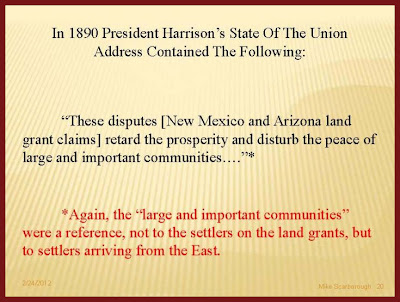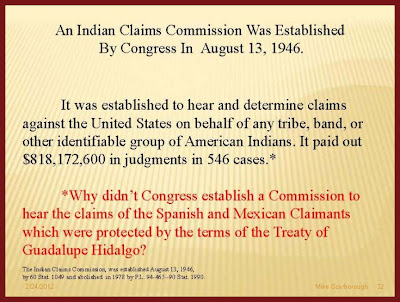Trespassers on Our Own Land
Trespassers is a comprehensive history of how and why the United States, while suffering from its long standing belief in Manifest Destiny, unlawfully removed millions of acres of land from pre-existing Spanish and Mexican land grants. It is structured as an oral history of one of the families who experienced the theft of their way of life--and for use as a political history, creative non-fiction and social science text book.
Tuesday, September 17, 2013
Say What?
Legitimate financial institutions no longer exist in our country, our world. In my opinion they have been replaced by continuing criminal enterprises -- imposters, who want us to believe they are financial institutions.
Friday, May 17, 2013
New Mexico Has Banned Pre-Statehood History from High School Text Books Since 1992
In
1992 New Mexico's Board of Education changed its educational standards from what
had previously been entitled: "Educational Standards for New Mexico Schools" to
"Standards for Excellence.
The new Content Standard for social studies, grades 9-12 thereafter was changed from the way it had read in 1976 and 1982:
"Social
Studies. All programs should emphasize the value of cultural diversity and
recognize the intrinsic worth of each culture in itself"
to:
"Content
Standard 1: Students are able to identify important people and events in order
to analyze significant patterns, relationships, themes, ideas, beliefs and
turning points in New Mexico [since statehood], United States, and world history
in order to understand the complexity of the human experience. Students
will:
"9-12
Benchmark 1-A. New Mexico: analyze how people and events of New Mexico have
influenced United States and world history since statehood."
The
significance of this change was that textbooks used in grades 9-12 after 1992
could no longer address pre-statehood history: No longer could the thousands of
years of New Mexico's Indian history nor the hundreds of years of Spanish and
Mexican history be included in textbooks used by grades 9 thru 12.
Ironically,
the standards for grades 5-8 were not limited in 1992 as they were for grades
9-12. Upon inquiry I was advised that once students in grade 7 had studied
pre-statehood history there was no longer a need to teach the subject in high
school. My question regarding this response is: then why teach post-statehood
history again in high school as it had also been taught in the seventh
grade?
I
must qualify what I have said about the 1992 limitations New Mexico placed upon
grades 9-12 in regard to the textbook presently used for those grades. The
authors of A History of New Mexico Since Statehood, the book currently
used in grades 9-12, (which was published by UNM Press) namely, Richard Melzer,
Robert Torrez and Sandra K. Mathews are to be commended for their efforts in
stretching the limits of the regulation as far as they did.
At
the very least, their Introduction and chapters allow inquisitive
students to realize that New Mexico's history began centuries before January 6,
1912.
Mike
Scarborough
trespasseronourownland.blogspot.com
Friday, April 12, 2013
My Review of Chicano Manifesto, Authored by Armando Rendon
As the movement toward immigration reform
has finally, once again, come to the forefront of important political issues I
recalled having read Chicano Manifesto,
the comprehensive history of the Chicano movement in the 1970s as studied and
lived by its author, Armando Rendon. Upon
rereading it I am even more convinced than I was when I first read it decades
ago that there is no better reference material available for politicians,
professors, teachers, students and supporters of immigration and the Chicano movement
than Chicano Manifesto.
Seldom in historical research are we able
to find available for comparison with current events such an excellent, decade’s
old, microscopic analysis as author Rendon’s
Chicano Manifesto.
It is indeed unfortunate that as we compare
the excellent road map provided by Rendon in Chicano Manifesto over forty years ago with that which has occurred
in the decades since that the movement has time and time again been met with numerous
obstructions and unfortunate detours along the route he suggested— yet
heartening that finally there isa brightening light at the end of the very
lengthy tunnel.
I suggest that unless one reads Chicano Manifesto and compares it to the
current interest in immigration reform it is not possible to fully comprehend
how far along Rendon’s Chicano Manifesto
road map the movement has come.
Thank you, Armando, for having taken the
time and effort to write and publish Chicano
Manifesto.
Thursday, February 28, 2013
BLM's Management of Mineral Acreage is Grossly Inequitable
Below is a listing of BLM managed subsurface and surface acreage in the various
states.
This is a very important document as it shows the federal government's
disparate approach to control of subsurface mineral rights across the country.
For example, Texas, with 168 million acres has only 4.5 million acres of
federally controlled subsurface mineral rights, Oklahoma, with 44 million acres
has only 2.3 million acres of federally controlled subsurface mineral rights,
while New Mexico, with 77 million acres, has 36 million acres of federally
controlled subsurface mineral rights.
The result of this is that Texas and Oklahoma own, either publicly or
privately, the vast majority of the oil and gas production royalties and
therefore receive vastly more money than does New Mexico.
Only be setting up a Task Force is it possible for New Mexico to
challenge the federal government to release New Mexico's mineral rights or, at a minimum,
to return more of the 55% of the royalties the federal goverment keeps from our
school sections.
This document also reflects not only the desperate treatment of the western
states but as well the manner in which the federal government treats the "eastern
states" compared to the western states: Only 40 million acres of the 699 million
acres of mineral rights acreage across the country are within the "eastern
states."
While our Legislature is scrambling to find a way to increase the amount of
money available for education, a possible solution what would not require an
amendment to our constitution or an increase in taxes is right before our eyes, we need to request
an increase in the percent of royalties we receive from the school sections
while, at the same time, demanding additional school sections.
Of course, without a vehicle to drive this request, we may go another 100
years without increasing the money we need for education by other than tax
increases or withdrawing additional money from our permanent fund.
We need a Task Force to study this issue, along with many other issues.
How, other than by establishing a Task Force, can we realistically confront this
gross inequity?
MINERAL
AND SURFACE ACREAGE
MANAGED BY THE BLM
MANAGED BY THE BLM
State
|
Total State Acreage
|
Federal Minerals a
|
Federal Surface Landsb
|
BLM-Managed Public Lands d
|
||
Alaska
|
365.48
|
237.0
|
237.0
|
73.0
|
||
Arizona
|
72.69
|
35.8
|
33.0
|
12.2
|
||
California
|
100.21
|
47.5
|
45.0
|
15.3
|
||
Colorado
|
66.49
|
29.0
|
24.1
|
8.3
|
||
Eastern States
|
h
|
40.0
|
40.0
|
0.1
|
||
Hawaii
|
4.11
|
0.6
|
0.6
|
0.0
|
||
Idaho
|
52.93
|
36.5
|
33.1
|
11.6
|
||
Kansas
|
52.51
|
0.8
|
0.7
|
0.0
|
||
Montana
|
93.27
|
37.8
|
26.1
|
8. 0
|
||
Nebraska
|
49.03
|
0.7
|
0.7
|
0.1
|
||
Nevada
|
70.26
|
58.7
|
58.4
|
47.8
|
||
New Mexico
|
77.77
|
36.0
|
26.5
|
13.4
|
||
North
Dakota
|
44.45
|
5.6
|
1.1
|
0.1
|
||
Oklahoma
|
44.09
|
2.3
|
1.7
|
0.1
|
||
Oregon
|
61.60
|
33.9
|
32.4
|
16.1
|
||
South
Dakota
|
48.88
|
3.7
|
2.1
|
0.2
|
||
Texas
|
168.22
|
4.5
|
4.5
|
0.1
|
||
Utah
|
52.70
|
35.2
|
34.0
|
22.8
|
||
Washington
|
42.69
|
12.5
|
12.2
|
0.4
|
||
Wyoming
|
62.34
|
41.6
|
30.0
|
18.3
|
||
Total
|
1,529.72
|
699.7
|
643.2
|
247.9
|
Subscribe to:
Comments (Atom)












































